Discovery tunes in to Tour channel
Discovery Channel team boss Johan Bruyneel, and his tapped general classification rider American...
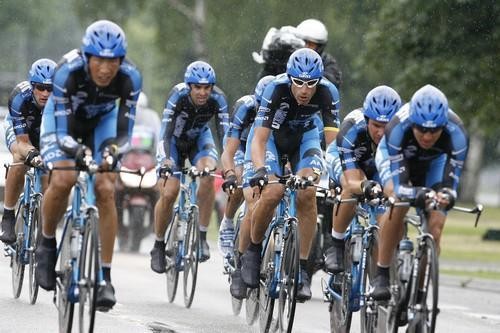
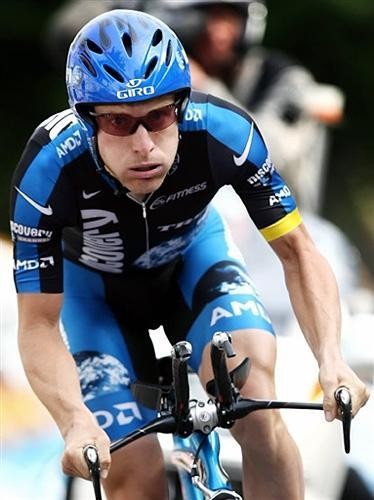
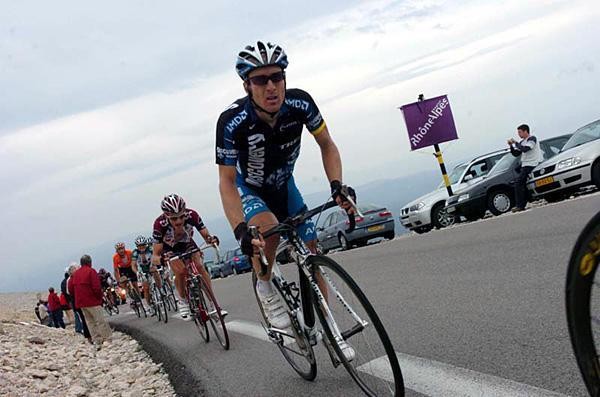
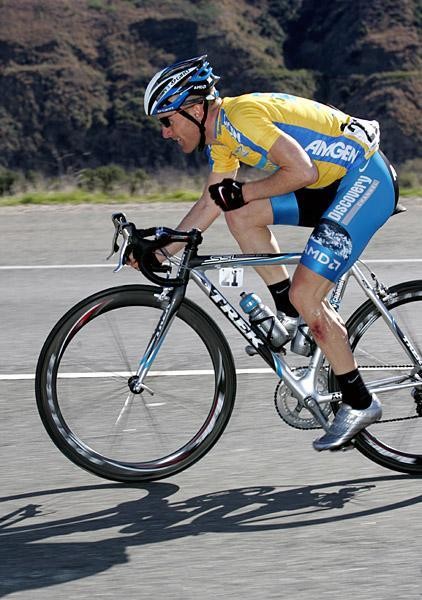
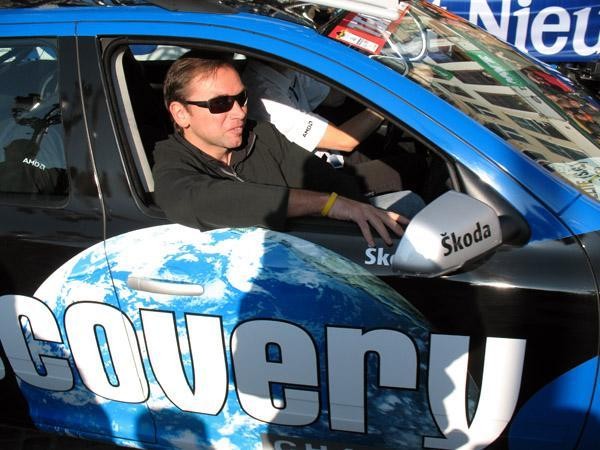
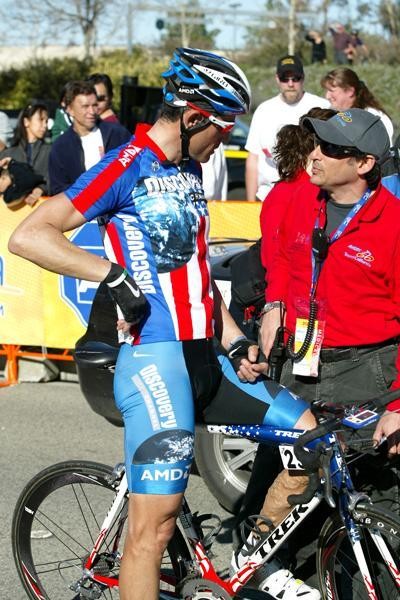
Tales from the peloton, June 30, 2007
When the Disco needed him, Cyclingnews' Mark Zalewski answered the call and found Discovery Channel's Johan Bruyneel, and Levi Leipheimer discussing the squad's Tour preparations and more.
Discovery Channel team boss Johan Bruyneel, and his tapped general classification rider American Levi Leipheimer, spoke to the media in a teleconference designed to announce the team's roster for the 2007 Tour de France. But with the nine-man squad revealed the questions quickly turned to the bigger issues of the day, ranging from doping to next year's sponsorship to predictions for the team's Tour performance post-Lance.
"I think personally that Levi is capable of finishing on the podium," Bruyneel said responding to why he chose Leipheimer. "He has been in the top ten three times and on the podium of the Tour of Spain. Last year I saw Levi really strong in the Dauphiné and the year before he finished sixth and the fifth place he only lost on the last stage into Paris to Vinokourov. Knowing that Vinokourov is now the [Tour de France] favourite I have to think that [Levi] is a serious candidate for the podium."
Bruyneel agrees with the popular pick of Astana's Alexandre Vinokourov as the pre-race favourite and even sees similarities to the seven years in which he directed the winner's team. "I see Vinokourov as the number one favourite and Astana as strong to support him," noted Bruyneel. "I think it will be like when Lance [Armstrong] was with us and we were the big favourite - with everyone looking and trying to follow hoping for him to have a weak moment, but I don't think Vinokourov is as far ahead of the competition as Lance was."
"Vinokourov is a rider with a very aggressive style, attacking at moments when he was not expected to attack," he added. "But also he has never been in the role of the number one favourite. I'm convinced that he will still be aggressive but he won't be able to go in the long breakaways. I expect him to be more conservative and he will attack when everyone expects him to attack - on the last climb or when one of his rivals is in trouble."
Levi on Levi
Get The Leadout Newsletter
The latest race content, interviews, features, reviews and expert buying guides, direct to your inbox!
Leipheimer was his usual reserved self, even when describing his feelings for being tapped with the team's GC hopes. "It definitely does mean a lot to me," Leipheimer said. "I started my career with this team and now to be back with Johan and with riders like George it is like a dream come true. And to go in as the leader of the classification is something to be proud of for me."
Much of the questions directed at Levi, or to Bruyneel about Levi, focused on the difference between last year's Dauphiné Libéré and this year - with the American dominating the traditional pre-Tour race in 2006 only to go on to a less-than-ideal Tour four weeks later. This year, Leipheimer had a quiet but confident Dauphiné this year, finishing second in the opening prologue, eighth on Mont-Ventoux and in the top 25 overall.
"For sure the Dauphine was not as strong for me this year as it has been in the last two years, but it shows I am still growing and improving my form," admitted Leipheimer. "I think in four weeks when we get to the mountains of the Tour the plan this year is for me to be better this year than I had the past two years."
Bruyneel echoed Leipheimer's comments, saying that this was a directive of his after allowing Leipheimer to target his home race, the Tour of California.
"Especially with what I saw last year, he was at a high level in the month of June and he basically won the Dauphiné by himself because his team was not there to support him," said Bruyneel. "Then in the Tour things did not go accordingly - he had to pay for [the Dauphiné win] in July. He wanted to do a good Tour of California, which he won. In Tour de Georgia he was one of the strongest guys but a breakaway decided to go up the road."
"I said to Levi from the beginning that in the Dauphiné he should take it a little easier than last year, knowing that from the end of the Dauphiné to the mountains of the Tour it is more than a month," added Bruyneel. "He listened to that."
"The Dauphiné was not super like last year and I hope he can reverse things by being in the same shape he was in the Dauphiné [last year] for the Tour this year. He did a few good tests - the prologue was great and he almost won the final stage. He left that race with a good feeling but not having given it 100 percent."
Bruyneel said that difference between racing to win and racing to train is immense. "If you go into a race with a little less focus - racing for the top of the classification takes a lot of energy out of you," he explained. "He left the race with a good feeling but he left without having to give 100 percent."
The straight dope
Much of the questions predictably centered on the ongoing problems of drugs in the sport, and Bruyneel was not reserved in his comments. When asked what needs to be done in order to finally lift the sport out of the scandals, he responded, "It's a question we are all debating."
"Personally I would like to take it further than the doping scandals," he said. "[The scandals] are there and a problem, but are a part of the whole system of cycling struggling - the big battles between the UCI and the organisers, the ProTour accepted and not accepted... I think cycling has to look at the sport with a new vision."
"Don't forget that probably 90 percent of everyone involved in our sport is an ex-bike [racer], from managers to organisers to even people at the UCI," he pointed out. "I include myself in this, and we are very good at doing our job from the sports side. What cycling is lacking right now is an expert on the whole picture. We need to bring in an expert on solving a crisis situation... other than the people involved right now. I don't know who that can be but I am pretty sure there are people out there, a business guru or whatever. I think that has to happen because cycling is a sport of tradition and the way people are trying to solve problems right now, it is definitely not in the right direction."
Bruyneel was also asked what he thinks of the much-touted anti-doping programmes of teams like T-Mobile and CSC, to which he responded that the Discovery Channel has a similar programme, only not used as a PR tool. "It is two teams who have been dealing with a scandal last year and it is not a coincidence that those two teams have started those anti-doping programmes and have made big announcements about it," Bruyneel said. "I am not saying it is not useful, but I honestly don't see what else those two teams can do beyond the testing of the UCI. The biggest advantage for those teams is to get their credibility back, and it works."
"Our internal testing is stricter than the UCI rules and it works, but we don't feel the need to talk about it," he explained. "All I can say that in our testing in the last 12 years we have never had a positive case and never had a rider test for abnormal blood levels. I think that is a pretty unique track record."
Leipheimer was asked if he thought the doping scandals have diminished a Tour victory, to which he responded with an air of disbelief. "I don't understand why it would diminish winning the Tour," he responded. "Winning the Tour is always a huge achievement. Every single rider who takes the start in the Tour is extremely strong - it is the best 200 riders in the world. Everyone is fighting to be in the front and fighting to win a stage."
"If I win the Tour there will probably be a lot of people will say that," he said, referring to accusations of doping. "Hopefully the test results will speak for themselves. If you win the Tour you are usually tested every other day."
No Logo
Another hot topic was the lack of a title sponsor for the team in 2008 - something that is usually inked before the Tour as riders without contracts often begin formal talks during the race. By the time a sponsorship question for Bill Stapleton, the founder of the team's management company, came up, he had already stepped away from the teleconference for another meeting. However, Bruyneel fielded the question.
"I'm informing the riders what is going on but also saying there is nothing signed at the moment," said Bruyneel. "I remain positive that we will sign a big sponsor - the sooner the better of course. But at the same time we have a big part of our riders who have a contract with the team next year if indeed the team goes on. It is a good thing for the team and riders to know that we are ensuring a sponsorship and that the majority of the team will stay together if that is the case."
Even though the bulk of the riders are contractually obligated to stay with the team if a title sponsor is found, Bruyneel said that the team is still being reasonable to those riders. "There is a deadline, of course," he stated. "We know we cannot wait if we can't find a sponsor until October to tell them."
As for not having a sponsor before the Tour, Bruyneel said that it should not affect how the team races. "It's very important but the Tour de France is always important. I personally think for continued sponsorship our search should not depend on the performances in the Tour de France. I think over the years we have created a program that is very attractive with a lot of victories. It is still a strong team. Of course we want to perform as strong as we can but to say we have to perform very strongly in order to find a sponsor exclusively is in my opinion a mistake and something we don't feel."
Bruyneel answered frankly when asked if the doping scandals has affected the ability to secure a replacement sponsor. "Has it had an impact in our sponsorship search? Yes, it definitely has."
The roster: experience and strength
Last year, the first year post-Lance, was a learning year for Bruyneel, having been used to building the team around a single rider and a single mission.
"It was the first year after Lance's retirement and we had four riders with aspirations of winning," Bruyneel admitted. "They had all been in a role of supporting and all of a sudden had to do it themselves. It was a new style of racing we had to adopt and we were not ready for it. I think from the results of this year we have a new team with different riders and a new racing style. It has been our most successful season ever before the Tour.
"Levi will be our only GC rider," he declared. "Our ambitions may be a little bit lower [than with Lance] but ambitions to be on the podium means you are close to first place and you never know what could happen."
"I went for experience and some stage hunters, as we call them," Bruyneel said about his choices in determining the Tour squad. "Levi is the leader and definitely needs strong riders to support him. On the contrary to other years with Lance and our only mission was to win the Tour de France we needed a team to support him in every single moment - on the flats, in the mountains and the crosswinds."
"This year is similar but different because Levi is not the number one favourite of the race, so we can put riders in there with personal ambitions to win a stage," added Bruyneel. "If Levi is strong enough to stay with the favourites he can get very far on GC - and if he finds himself in the lead we have a strong enough team to support him. But there are riders like George, Popovych and Contador who can try to win a stage too. I think it is a combination of experienced guys like Noval and Martinez who will stay with Levi and those guys to get a result for themselves too."
Leipheimer also commented on the strength of the team, particularly focusing on the season so far as example of its strength. "I think there were days there that will go in cycling history - especially the day George broke his wrist and then went on to help bring back a dangerous breakaway. That was something I had never experience before - to have such a strong and dedicated team like that."
"There are guys like George and Popo that can win stages and I believe they will win one or two stages, at least," noted Bruyneel. "I am fully in agreement with that and I think the team should have those goals."
Leipheimer also exemplified the experience factor when asked about his take on the parcours. "I have ridden all the important mountain stages with Alberto, Egoi and Vladimir - first the Pyrenees and then the Alps," said Leipheimer. "The stage to Tignes in the Alps will be a very decisive stage. In the Pyrenees - which I'd say are harder this year than the Alps because of the amount of climbs and in the third week - the Plateau-de-Beille which is a hard 15km final climb, the Tour can be won on that day."
"The following day we finish in Le Louron and this includes a new climb in the Tour and I think it will be a surprise for the riders in Tour and the fans... it's very epic!" said an enthused Leipheimer. "Then what I call the queen stage of the Tour, and could easily be a seven hour day, even for the winner - it ends on top of the [Col d']Aubisque."
Bruyneel was asked whom he thought, other than Vinokourov, were the riders to watch. "The big danger of Astana is that they also have Kloden who has finished on the podium already - but Vinokourov is from Kazakhstan. Then we have a few others - Sastre is always there, Cadel Evans, Karpets has won Catalunya and Tour de Suisse, Menchov will be a top five - and of course we count Levi in that list too."